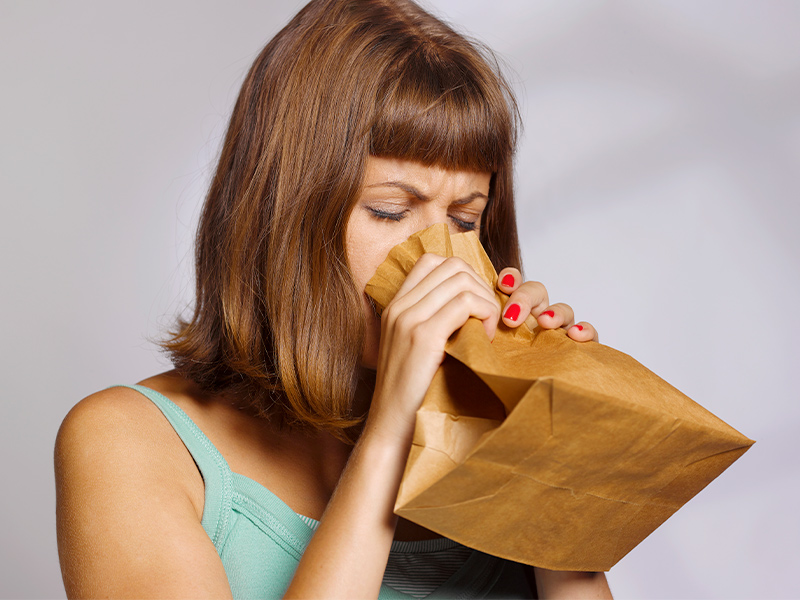Is it a panic attack or anxiety? Why it’s important to know the difference
The terms ‘panic attack’ and ‘anxiety’ are often used interchangeably, but they are not the same. Understanding the differences is essential for effective treatment.
If you’ve ever heard someone refer to a panic attack or an anxiety attack, you’ve probably wondered if they’re exactly the same thing.
And you’d be far from alone, Sydney clinical psychologist Jonathan Gaston says.
“The problem here is the word ‘attack’; people use panic attack and anxiety attack interchangeably, but what we’re ultimately talking about is a difference between heightened anxiety as an onset, and panic itself,” Jonathan says.
What you need to know about ‘anxiety attacks’
Commonly used by people who are suffering from anxiety, “anxiety attack” isn’t an official term, nor is it included in the Diagnostic and Statistical Manual of Mental Disorders, the health bible many mental health professionals abide by.
What it is, however, is an extended or intense period of anxiety that has the capacity to disrupt lives – hence the popularised usage of the word “attack”.
Symptoms of heightened anxiety
- The sense of anxiety or panic builds gradually, with the symptoms lasting much longer than the symptoms of a panic attack – in many cases, they may persist for days, weeks or months
- Feeling nervous or restless
- Irritability
- Difficulty controlling feelings of worry
- Difficulty concentrating
- Sleep disturbances and fatigue
- Muscle aches, headaches or unexplained pains
What you need to know about panic attacks
When you think about an attack that renders you terrified or convinced you’re either dying or losing your mind, this is it.
Symptoms of a panic attack
- An intense, all-consuming fear that strikes suddenly, without warning
- Unlike anxiety episodes (above), a panic attack tends to pass within minutes
- Typically appears with a trigger, but can sometimes occur without a trigger present
- Hot flushes and sweating
- A sense of detachment or disassociation, almost as though you’ve “disappeared”
- Rapid heart rate and/or chest pain
- Dizziness or lightheadedness
- Shortness of breath or hyperventilation
- Shaking or trembling
- Numbness or tingling in the extremities
What to do if you have a panic attack
According to data from Beyond Blue, one quarter of Australians will suffer from an anxiety disorder at some point in their lifetime so, with these statistics in mind, it’s incredibly likely that you may experience a panic attack at some stage, Jonathan says.
“In many cases, it will be triggered by something – a phobia or an extreme fear response to a real threat or scary situation – but most of us won’t go on to develop a disorder,” he says.
“What’s important is that we understand that the reaction we’re having to this fear that’s flooded our body isn’t dangerous; the symptoms don’t feel good, but it’s helpful to remember that they’re not harmful to us either.”
In most cases, there’s little you can do except to ride it out, Melbourne clinical psychologist Catherine Madigan says.
“If you think you’re going to pass out – and it’s rare that people do so – you could try lying down and slowing down your breathing,” Catherine says.
“But what’s really important is to take a look at and overhaul your lifestyle long before these attacks occur with any regularity.”
Lifestyle modifications that may help
Catherine recommends getting extra sleep, reducing your caffeine intake, and exercising for at least half an hour five times a week – which is said to be as good as antidepressants for mild to moderate panic.
And quit the cigarettes, she adds.
“I was recently reading a study which found you’re far more likely to have a panic attack if you smoke, so why make your life more difficult?” Catherine says.
When to see your doctor
Of course, if you think feelings of anxiety are increasing or getting the better of you, it’s a good idea to speak to your GP.
“You don’t have to wait until you’re having panic attacks,” Jonathan says.
“If you’re experiencing heightened anxiety that is occurring at a frequency where it’s impacting on your life, get a referral from your GP to see a psychologist – you don’t have to suffer alone.”
Read more on anxiety and panic attacks:
- What causes panic attacks?
- How to recognise high-functioning anxiety
- Common foods that could be to blame for feeling anxious
Written by Dilvin Yasa.





